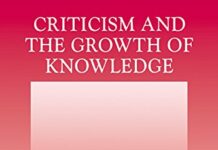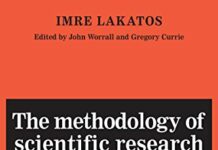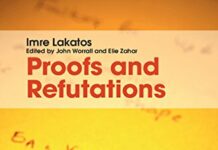
Ebook Info
- Published: 1980
- Number of pages: 285 pages
- Format: PDF
- File Size: 19.44 MB
- Authors: Imre Lakatos
Description
Imre Lakatos’ philosophical and scientific papers are published here in two volumes. Volume I brings together his very influential but scattered papers on the philosophy of the physical sciences, and includes one important unpublished essay on the effect of Newton’s scientific achievement. Volume 2 presents his work on the philosophy of mathematics (much of it unpublished), together with some critical essays on contemporary philosophers of science and some famous polemical writings on political and educational issues.
User’s Reviews
Reviews from Amazon users which were colected at the time this book was published on the website:
⭐Imre Lakatos (1922-1974) was a Hungarian philosopher of mathematics and science; the companion volume to this book is
⭐.The Editor’s Introduction states, “When Imre Lakatos died in 1974, many friends and colleagues expressed the hope that his unpublished papers would be made available. Some were also interested in seeing his contributions to journals and conference proceedings collected together in a book… we have prepared two volumes of selected papers which we hope will meet these demands. None of the papers published here for the first time was regarded by Lakatos as entirely satisfactory…” Volume 2 contains papers on the philosophy of mathematics, as well as some essays on contemporary philosophers on political and educational matters.He explains, “The Frege-Russell approach aimed to deduce all mathematical truths—with the help of ingenious defintions—from indubitably true logical axioms. It turned out that some of the logical … axioms were not only not indubitably true but not even consistent. It turned out that the sophisticated second … axioms—devised to avoid the known paradoxes—even if true, were not indubitably true (and not even indubitably consistent), and that the crucial evidence for them was that classical mathematics might be EXPLAINED—but certainly not PROVED—by them.” (Pg. 30)He states, “So we cannot prove in science; the most we can do, if we are anti-inductive empiricists, is to disprove. If, however, we extend our critical attitude to the facts too… we can allow only tentative recognition to basic statements. The Popperian epistemological zipfastener, unlike the zipfastener of logical positivism, is unsuitable even for infallible disproof. It cannot prove and it can disprove only tentatively. As to the heuristic zipfastener, this may start from a reasoned fact… may move upwards through a deductive passage, and then make an inductive jump to the Theory of Gravitation; and then turn back along a purely deductive path, erase the former fact… and so on. There are no absolutely hard, stubborn, perfectly reasoned facts.” (Pg. 90)He observes, “But if we start from a proposition P and draw consequences from it rather than try to look for premises from which it follows, then what we objectively do is TEST rather than PROVE. Thus in analysis we test—Popperianwise—a conjecture; but if we FAIL to refute it, we may succeed in turning it first into a proof and then into a mathematical research programme.” (Pg. 95-96)He argues, “According to the demarcationist one theory is better than another if it satisfies certain objective criteria. According to the elitist one theory is better than another if the scientific élite prefers it. But then it is vital to know who belongs to the scientific élite. While élitists claim that no universal criteria for appraising scientific achievements are possible they may admit the possibility of universal criteria for deciding whether persons or communities belong to the elite.” (Pg. 112-113)He asserts, “where corroborations of two theories are incomparable, so are their reliabilities… We can only judge the reliability of eliminated theories from the vantage point of our present theories… we cannot give even a fallible absolute estimate of Einstein’s theory itself before it, in turn, is superseded by another theory. Thus we cannot grade our best available theories for reliability even tentatively, for they are our ultimate standards of the moment. Only God could give us a correct, detailed estimate of the absolute reliability of ALL theories by checking them against HIS blueprint of the universe.” (Pg. 185)Though far less well-known than Popper or Thomas Kuhn, Lakatos was one of the most important philosophers of science and mathematics of the 20th century, and his writings are “must reading” for anyone studying the philosophy of science.
⭐Foundations of mathematics. The Hilbert–Russell meta-mathematical programmes were meant to establish the infallibility of mathematics by the Euclidean method: “derive all mathematics from trivial logical principles” (p. 12). Although “From the seventeenth to the twentieth century Euclideanism has been on a great retreat” (p. 10), having failed again and again in numerous branches of knowledge, Russell and others had no doubt that mathematics would be different: “Too often it is said that there is no absolute truth … Of such scepticism mathematics is a perpetual reproof; for its edifice of truths stands unshakeable … to all the weapons of doubting cynicism” (p. 14). “We all know how the brief Euclidean ‘honeymoon’ gave place to ‘intellectual sorrow’, how the intended logico-trivialization of mathematics degenerated into a sophisticated system, including ‘axioms’ like that of reducibility, infinity, choice, and also ramified type theory—of on the most complicated conceptual labyrinths a human mind ever invented. … There even emerged the completely un-Euclidean need for a consistency proof to ensure that the ‘trivially true axioms’ should not contradict one another. All this and what followed must strike any student of the seventeenth century as a déjà vu: proof had to give way to explanation, … Euclidean theory to empiricist theory. We also encounter the same refusal to accept the dramatic change”, e.g. “Like Newton hoping to explain the Law of Gravitation by principles of Cartesian push-mechanics, Russell hoped for the trivialization of the reducibility axiom” (p. 14). But eventually Russell admitted defeat: “When pure mathematics is organized as a deductive system … it becomes obvious that, if we are to believe in the truth of pure mathematics, it cannot be solely because we believe in the truth of the set of premisses. Some of the premisses are much less obvious than some of their consequences, and are believed chiefly because of their consequences. … The only way in which work on mathematical logic throws light on the truth or falsehood of mathematics is by disproving the supposed antinomies. This shows that mathematics may be true. To show that mathematics is true would require other methods and other considerations.” (p. 17). Thus logic “is an empiricist theory” like any other, albeit one that is hard to test. “The only way of criticizing this peculiar empiricist theory is, on the face of it, to test it for concistency. This leads us to the Hilbertian circle of ideas.” (pp. 19-20). “Gödel’s second theorem was a decisive blow to this hope for a Euclidean meta-mathematics. … consistency proofs have to contain enough sophistication to render the consistency of the theory in which it is carried out dubitable … For instance, Goldbach’s conjecture—that every number is the sum of two primes—might be formally proved to-morrow, but we shall never know that it is true. For it would only be true if meta-mathematics, meta-meta-mathematics … ad infinitum are consistent. This we shall never know. Gödel’s first theorem showed a second way in which a formal theory could misfire: if it has a model at all, it has more models than intended. … If the Goldbach conjecture is true in its intended interpretation, but false in an unintended one, there will be no formal proof leading to it in any formalization. Gödel’s discovery of omega-inconsistent systems was still worse. … A formalized arithmetic might be consistent, i.e. have models, but none of the models might be the intended one; every model, if containing all the numbers, might contain some other ‘class-alien’ elements which might provide counterexamples to propositions which are true in the narrower domain of the intended interpretation. In a consistent, but omega-inconsistent system we might prove the negation of the Goldbach conjecture even if the Goldbach conjecture is true.” (pp. 20-21). Contemporary logic should not pretend to be the foundations of mathematics. “We read in one of the most competent books written on the subject that the ‘ultimate test whether a method is admissible in meta-mathematics must of course be whether it is intuitively convincing.’ But why then not stop earlier, why not say that ‘the ultimate test whether a method is admissible in arithmetic must of course be whether it is intuitively convincing,’ and omit meta-mathematics altogether…?” Or, for that matter, “why on earth have ‘ultimate’ tests” at all? “Why foundations, if they are admittedly subjective? Why not honestly admit mathematical fallibility, and try to defend the dignity of fallible knowledge from cynical scepticism, rather than delude ourselves that we shall be able to mend invisibly the latest tear in the fabric of our ‘ultimate’ intuitions?” (p. 23).”The method of analysis–synthesis.” A famous “heuristic” in Euclidean geometry was to prove a theorem by assuming it to be true, deriving something known (analysis), and then reversing the steps to obtain a proof (synthesis). This approach was explicated by Pappus, whence it may be called the “Pappusian Circuit” (p. 76). “A main feature of the story of modern scientific method is the critical elaboration of the ancient Pappusian Circuit into the Cartesian Circuit, followed—in spite of some partial successes and several intriguing rescue-operations—by its breakdown” (p. 77). “Both Descartes and Newton were very explicit about the necessity of starting the analysis from facts, from which one proceeded to ‘mediate causes’ and from there to first principles. They despised those who tried to arrive at first principles with no care for facts, by ‘rash anticipation’ instead of by laborious analysis” (p. 77), e.g., “Hooke only guessed the inverse square law, but he, Newton, deduced it from Kepler’s empirical laws” (p. 80). This is also the meaning of Newton’s “Hypothesis non fingo.” “Hypotheses have to be embedded in a Cartesian Circuit and thereby cease to be hypotheses” (p. 77). “Descartes’s main interest was to find a method of discovery of infallible knowledge, an infallibilist heuristic. The paragon of infalliable knowledge was of course Euclidean Geometry. And the only extant method was of discovery in Euclidean Geometry was the Pappusian Circuit. This was Descartes’s natural starting point.” (p. 83). “Now my differences with Hintikka’s and Remes’s rational reconstruction of Greek analysis–synthesis become clear. They base their reconstruction on the assumption that Pappusian analysis was a heuristic pattern in already axiomatized Euclidean Geometry … In my view the most exciting analyses of Greek Geometry were pre-Euclidean and their role was to generate Euclid’s axiomatic system.” (p. 100).Criticism of falsificationism. Popper “has refused to notice two [historical] facts: (1) ‘Crucial experiments’ are frequently listed first as harmless anomalies, rather than refutations …; and (2) All important theories are born ‘refuted’.” (p. 201). Further discussion on this is limited to Lakatos’ effortless refutations of two minor falsificationists (Agassi and Grünbaum).”Cauchy and the Continuum.” Conventional histories claim that Cauchy made several “mistakes” in his Cours d’Analyse, e.g. his proof that the limit function of a convergent series of continuous functions is always continuous. This seems strange, however, because there were already published counterexamples and “today, if one gave Cauchy’s false proof to a bright undergraduate, it would not take him long to put it right; and indeed, Seidel [who eventually corrected the proof] did not find the problem at all difficult! What inhibited a whole generation of the best minds from solving an easy problem?” (pp. 46-47). Actually, there is no “mistake”, since the alleged counterexamples do not converge in Cauchy’s sense, as he himself explained: “His example is the series sin(x)+sin(2x)/2+sin(3x)/3+… He shows that in the neighbourhood of zero where the limit function is discontinuous, ‘the value of the remainder for xs very near to zero, for instance for x=1/n where n is a very large number, can differ considerably from zero,'” so that the series does not converge at the “moving point x=1/n” where n goes to infinity (p. 57).
⭐The author introduces the main lines of discussions in epistemeolgy and philosophy of mathematics in a very understandable but comphrehensive way. It is a brilliant reference book for the subject which also contains so-far unpublished articles of the author.
⭐”Mathematics, Science and Epistemology” is the Volume 2 of the Philosophical Papers of Imre Lakatos, after his famous “The Methodology of Scientific Research Programmes”.We find here papers on the philosophy of mathematics, the thought of the author about the logic of discovery in mathematics (see also “Proofs and Refutations”), some critical essays on contemporary philosophers (Popper, Toulmin…), and also politics, sociology and education. An interesting book for a deeper approach of the methodology of mathematics and more generally to compare the personalities and the views of Lakatos and Popper facing the logic of scientific discovery and the whole society. Lakatos remains a very good reference with his research programmes challenging Popper’s epistemology.
⭐Was pleased to be able to find this book.
⭐
Keywords
Free Download Mathematics, Science and Epistemology: Volume 2, Philosophical Papers (Philosophical Papers (Cambridge)) in PDF format
Mathematics, Science and Epistemology: Volume 2, Philosophical Papers (Philosophical Papers (Cambridge)) PDF Free Download
Download Mathematics, Science and Epistemology: Volume 2, Philosophical Papers (Philosophical Papers (Cambridge)) 1980 PDF Free
Mathematics, Science and Epistemology: Volume 2, Philosophical Papers (Philosophical Papers (Cambridge)) 1980 PDF Free Download
Download Mathematics, Science and Epistemology: Volume 2, Philosophical Papers (Philosophical Papers (Cambridge)) PDF
Free Download Ebook Mathematics, Science and Epistemology: Volume 2, Philosophical Papers (Philosophical Papers (Cambridge))



